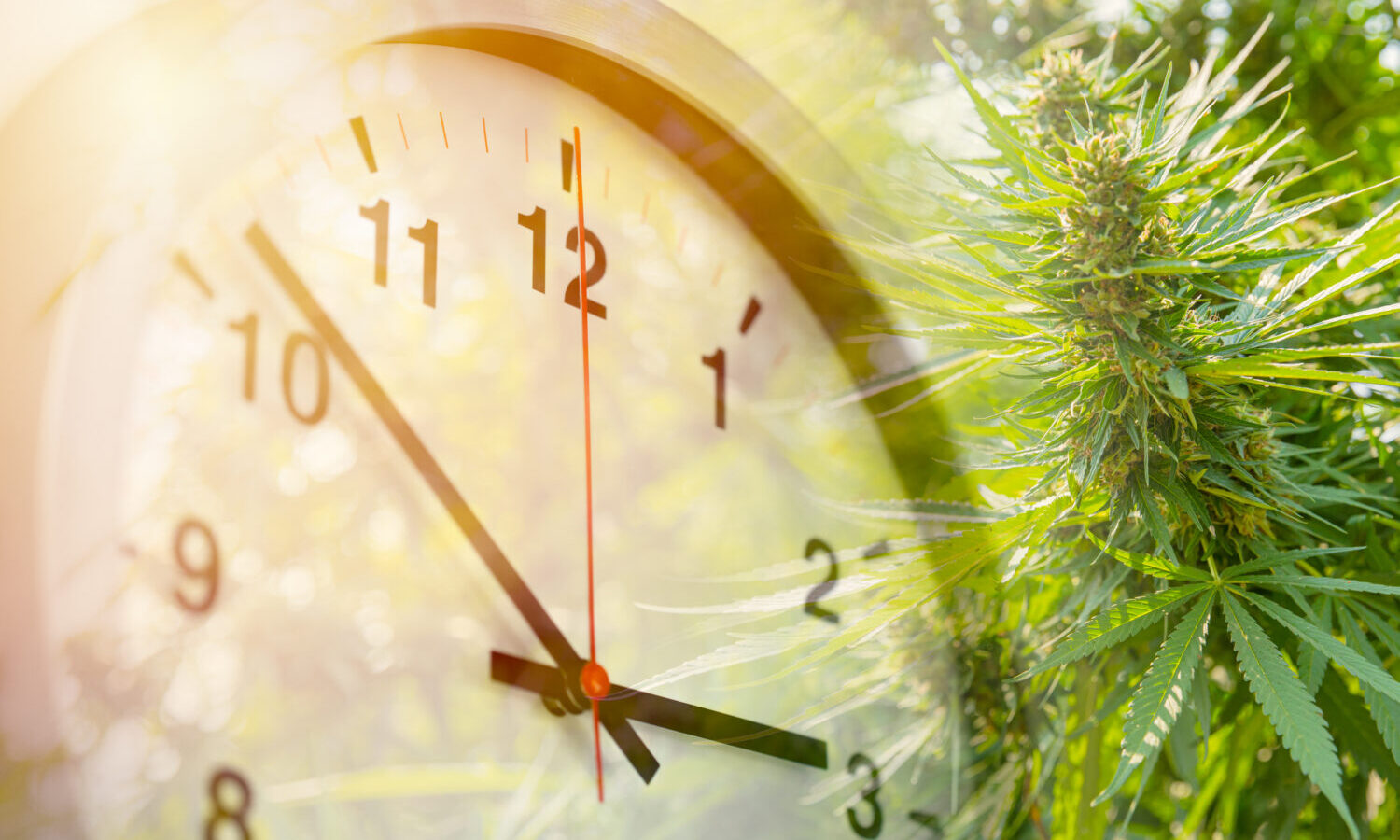Business
How Long Does It Take For Weed To Kick In?

How long it’ll take for your marijuana to start working is dependent on a few things. Here’s what you should know before you smoke weed, pop an edible, or use a sublingual.
It’s crucial to keep in mind that the length of time it takes weed to kick in varies from person to person due to three primary factors. First, how quickly your body metabolizes cannabinoids such as tetrahydrocannabinol (THC) and cannabidiol (CBD) will dictate the time it takes before the effects become noticeable. This factor is related to your unique endocannabinoid system.
Second, how you consume cannabis (your ingestion method) makes a huge difference in how long it takes for weed to kick in.
Finally, how empty or full your stomach is when you ingest cannabis, as in how much you’ve eaten that day, can also impact the time it takes for weed to kick in.
How long does it take to get high after smoking weed?
When trying to determine how long does it take to get high after smoking weed, you should know that smoking or vaping weed (inhalation) is the quickest way to get high. When you smoke weed, THC travels through your lungs and directly into your bloodstream. From there, the onset of the high comes on nearly instantly, although it can be anywhere from 5 to 15 minutes, and lasts 1–4 hours. While vaping marijuana produces a similar onset and high to smoking, the psychoactive effects from vaping are often stronger.
How long does it take to get high off edibles?
How long does it take to get high off edibles infused with cannabis? For new cannabis users or those who previously only smoked or vaped weed, you may be wondering, “how long does it take edibles to work?” The time it takes edibles to kick in varies much more than if you smoke weed. When you smoke weed, you are primarily feeling the effects of THC.
However, when you eat a cannabis edible, you also get 11-OH-THC (11-hydroxy-THC), which is a metabolite of THC produced when you orally ingest THC products. Since edibles require digestion and being processed by your liver before the active ingredients reach your brain, this process takes much longer. This means you might start to feel effects of edibles within 30 to 60 minutes, but it can take as long as two hours for the high to set in. While THC levels in the blood do not peak until 3 hours later, the high can last more than 8 hours.
How long does it take to get high off cannabis sublinguals?
We have discussed edibles and flower, but how long does it take to get high off cannabis sublinguals? THC sublinguals are discreet and perfect for a range of wellness uses. Sublingual simply means something is placed under your tongue, where it dissolves instantly. Our mouth’s mucous membranes are highly permeable, so they’re great for rapidly delivering substances.
RELATED: Asking For A Friend: How Long Does Marijuana Stay In Your System?
If you’ve ever used Listerine strips, you have a general idea of what sublingual means in terms of the rapid dissolvability of a substance that isn’t swallowed. Cannabis sublinguals act similarly. Most often in the form of strips or tablets, this convenient delivery system kicks in faster than edibles and tinctures (most tinctures are not kept in mouth long enough for oromucosal absorption.) Weed sublinguals typically take 15 to 30 minutes to take effect compared to edibles, which take up to 60 to 90 minutes, depending on the ingredients.
Another difference between edible and sublingual consumption is that cannabis sublinguals bypass the gastrointestinal tract. By dissolving in your mouth instead of eating or drinking it, sublingual cannabis strips avoid the effects of “first pass metabolism” in your liver. Generally, if the sublingual product is placed under the tongue (not on top), you should feel the results within 15 minutes.
RELATED: How Long Will Your Marijuana High Last? What Researchers Get Wrong
As for the taste, it varies from brand to brand. They tend to taste fruity or minty, so use caution and take care not to confuse them with your minty mouthwash strips. There is no one-size-fits-all answer to how long it takes for weed to kick in, but we can tell you that the time varies depending on a few varying factors.
So, the next time you and your friends are smoking, vaping, or trying out tasty edibles and someone asks how long it will be before they feel the effects, you can confidently tell them that it depends on many different aspects, including individual metabolism. And if you’re curious about how long it will take for weed to kick in for you specifically, download the Jointly app to track your cannabis experience.

Get started on your cannabis wellness journey
Have you started your cannabis wellness journey? Jointly is a new cannabis wellness app that helps you discover purposeful cannabis consumption so you can achieve your wellness goals with cannabis and CBD. On the Jointly app, you can find new cannabis products, rate products based on how well they helped you achieve your goals, and track and optimize 15 factors that can impact your cannabis experience. These 15 factors include your dose, the environment in which you consume cannabis, who you are with when you ingest, how hydrated you are, the quality of your diet, how much sleep you got last night, and more. Download the Jointly app on the App Store or the Google Play Store to get started on your cannabis wellness journey.
Sam Anderson is the content Director at Jointly, a cannabis wellness company powered by a proprietary data platform to help people reach their full potential. The company was created on the premise that purposeful cannabis consumption is the key to unlocking a better you. This article originally appeared on Jointly and has been reposted with permission.
Source: https://thefreshtoast.com/cannabis/how-long-does-it-take-for-weed-to-kick-in/
Business
New Mexico cannabis operator fined, loses license for alleged BioTrack fraud

New Mexico regulators fined a cannabis operator nearly $300,000 and revoked its license after the company allegedly created fake reports in the state’s traceability software.
The New Mexico Cannabis Control Division (CCD) accused marijuana manufacturer and retailer Golden Roots of 11 violations, according to Albuquerque Business First.
Golden Roots operates the The Cannabis Revolution Dispensary.
The majority of the violations are related to the Albuquerque company’s improper use of BioTrack, which has been New Mexico’s track-and-trace vendor since 2015.
The CCD alleges Golden Roots reported marijuana production only two months after it had received its vertically integrated license, according to Albuquerque Business First.
Because cannabis takes longer than two months to be cultivated, the CCD was suspicious of the report.
After inspecting the company’s premises, the CCD alleged Golden Roots reported cultivation, transportation and sales in BioTrack but wasn’t able to provide officers who inspected the site evidence that the operator was cultivating cannabis.
In April, the CCD revoked Golden Roots’ license and issued a $10,000 fine, according to the news outlet.
The company requested a hearing, which the regulator scheduled for Sept. 1.
At the hearing, the CCD testified that the company’s dried-cannabis weights in BioTrack were suspicious because they didn’t seem to accurately reflect how much weight marijuana loses as it dries.
Company employees also poorly accounted for why they were making adjustments in the system of up to 24 pounds of cannabis, making comments such as “bad” or “mistake” in the software, Albuquerque Business First reported.
Golden Roots was fined $298,972.05 – the amount regulators allege the company made selling products that weren’t properly accounted for in BioTrack.
The CCD has been cracking down on cannabis operators accused of selling products procured from out-of-state or not grown legally:
- Regulators alleged in August that Albuquerque dispensary Sawmill Sweet Leaf sold out-of-state products and didn’t have a license for extraction.
- Paradise Exotics Distro lost its license in July after regulators alleged the company sold products made in California.
Golden Roots was the first alleged rulebreaker in New Mexico to be asked to pay a large fine.
Source: https://mjbizdaily.com/new-mexico-cannabis-operator-fined-loses-license-for-alleged-biotrack-fraud/
Business
Marijuana companies suing US attorney general in federal prohibition challenge

Four marijuana companies, including a multistate operator, have filed a lawsuit against U.S. Attorney General Merrick Garland in which they allege the federal MJ prohibition under the Controlled Substances Act is no longer constitutional.
According to the complaint, filed Thursday in U.S. District Court in Massachusetts, retailer Canna Provisions, Treevit delivery service CEO Gyasi Sellers, cultivator Wiseacre Farm and MSO Verano Holdings Corp. are all harmed by “the federal government’s unconstitutional ban on cultivating, manufacturing, distributing, or possessing intrastate marijuana.”
Verano is headquartered in Chicago but has operations in Massachusetts; the other three operators are based in Massachusetts.
The lawsuit seeks a ruling that the “Controlled Substances Act is unconstitutional as applied to the intrastate cultivation, manufacture, possession, and distribution of marijuana pursuant to state law.”
The companies want the case to go before the U.S. Supreme Court.
They hired prominent law firm Boies Schiller Flexner to represent them.
The New York-based firm’s principal is David Boies, whose former clients include Microsoft, former presidential candidate Al Gore and Elizabeth Holmes’ disgraced startup Theranos.
Similar challenges to the federal Controlled Substances Act (CSA) have failed.
One such challenge led to a landmark Supreme Court decision in 2005.
In Gonzalez vs. Raich, the highest court in the United States ruled in a 6-3 decision that the commerce clause of the U.S. Constitution gave Congress the power to outlaw marijuana federally, even though state laws allow the cultivation and sale of cannabis.
In the 18 years since that ruling, 23 states and the District of Columbia have legalized adult-use marijuana and the federal government has allowed a multibillion-dollar cannabis industry to thrive.
Since both Congress and the U.S. Department of Justice, currently headed by Garland, have declined to intervene in state-licensed marijuana markets, the key facts that led to the Supreme Court’s 2005 ruling “no longer apply,” Boies said in a statement Thursday.
“The Supreme Court has since made clear that the federal government lacks the authority to regulate purely intrastate commerce,” Boies said.
“Moreover, the facts on which those precedents are based are no longer true.”
Verano President Darren Weiss said in a statement the company is “prepared to bring this case all the way to the Supreme Court in order to align federal law with how Congress has acted for years.”
While the Biden administration’s push to reschedule marijuana would help solve marijuana operators’ federal tax woes, neither rescheduling nor modest Congressional reforms such as the SAFER Banking Act “solve the fundamental issue,” Weiss added.
“The application of the CSA to lawful state-run cannabis business is an unconstitutional overreach on state sovereignty that has led to decades of harm, failed businesses, lost jobs, and unsafe working conditions.”
Business
Alabama to make another attempt Dec. 1 to award medical cannabis licenses

Alabama regulators are targeting Dec. 1 to award the first batch of medical cannabis business licenses after the agency’s first two attempts were scrapped because of scoring errors and litigation.
The first licenses will be awarded to individual cultivators, delivery providers, processors, dispensaries and state testing labs, according to the Alabama Medical Cannabis Commission (AMCC).
Then, on Dec. 12, the AMCC will award licenses for vertically integrated operations, a designation set primarily for multistate operators.
Licenses are expected to be handed out 28 days after they have been awarded, so MMJ production could begin in early January, according to the Alabama Daily News.
That means MMJ products could be available for patients around early March, an AMCC spokesperson told the media outlet.
Regulators initially awarded 21 business licenses in June, only to void them after applicants alleged inconsistencies with how the applications were scored.
Then, in August, the state awarded 24 different licenses – 19 went to June recipients – only to reverse themselves again and scratch those licenses after spurned applicants filed lawsuits.
A state judge dismissed a lawsuit filed by Chicago-based MSO Verano Holdings Corp., but another lawsuit is pending.
Source: https://mjbizdaily.com/alabama-plans-to-award-medical-cannabis-licenses-dec-1/
-

 Business2 years ago
Business2 years agoPot Odor Does Not Justify Probable Cause for Vehicle Searches, Minnesota Court Affirms
-

 Business2 years ago
Business2 years agoNew Mexico cannabis operator fined, loses license for alleged BioTrack fraud
-

 Business2 years ago
Business2 years agoAlabama to make another attempt Dec. 1 to award medical cannabis licenses
-

 Business2 years ago
Business2 years agoWashington State Pays Out $9.4 Million in Refunds Relating to Drug Convictions
-

 Business2 years ago
Business2 years agoMarijuana companies suing US attorney general in federal prohibition challenge
-

 Business2 years ago
Business2 years agoLegal Marijuana Handed A Nothing Burger From NY State
-

 Business2 years ago
Business2 years agoCan Cannabis Help Seasonal Depression
-

 Blogs2 years ago
Blogs2 years agoCannabis Art Is Flourishing On Etsy













